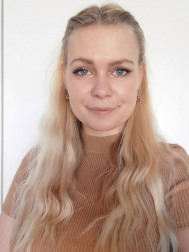Celebrating International Day of Women and Girls in Science

On International Day for Women and Girls in Science, we asked some female members of the I-Form team a series of questions, here are their answers
Helena Mylise Sørensen
Postgraduate Researcher, DCU
 How did you get involved in manufacturing?
How did you get involved in manufacturing?
I have a background in Food Science and Technology because I always had an interest in how science and engineering could be applied in real-world processes. Now my work is in the field of bioprocess engineering which means I get to go into full detail on biological processes in an attempt to better control them.
What do you find inspiring about your area of work?
What I find inspiring about my work is being part of the developmental process. There is a seemingly endless pool of things to explore, so every day feels like taking part in the forefronts of scientific discoveries.
What does a typical day in your job involve?
I spend a lot of my time in the laboratory where I am growing a type of bacterial cell that can be found in the gut and is known as a great probiotic.
What do you think can be done to diversify your profession?
I think a continuous effort to make women in engineering more visible is important. When I was choosing my undergraduate study, I was discouraged by the lack of women in engineering and ended up going into natural sciences even though, I actually wanted to pursue engineering more.
What would you say to girls in school/college who may be considering engineering/science as a career choice/study option?
Absolutely go for it. Engineering and science are not a gendered discipline and will only benefit by being diversified more.
The future of manufacturing - how would you like to see it developing in the future (over the next 10/20 years etc)?
Besides an improvement towards better gender equality, I think a development into more sustainable production is key. Thankfully, sustainability is already a big topic in manufacturing, so I am very hopeful for the future.
Aoife Doyle
Commercialisation Researcher
 How did you get involved in manufacturing?
How did you get involved in manufacturing?
I got involved in manufacturing research by studying biomedical engineering in UCD. As part of my master’s programme, I had to submit a research thesis, which I did in collaboration with I-Form, the Research Centre for Advanced Manufacturing. After finishing my degree, I stayed working for I-Form where I now work to improve 3D printing by analysing sensor data coming from the machines.
What do you find inspiring about your area of work?
I studied biomedical engineering because I wanted to contribute in some way towards better healthcare. I enjoy that the research surrounding additive manufacturing (3D printing) can be directly applied to the development of medical implants/devices, particularly custom-made devices due to the ease of design adjustment associated with additive manufacturing.
What does a typical day in your job involve?
My day typically involves using RStudio and Python programming to analyse data that has come from a laser-powder bed fusion printer. After a layer of material is created, a data file is released for analyses which contains information relating to the laser power, the infrared emissions and the light emissions coming from the melted powder during the manufacturing process. I then compare this sensor behaviour of the printer to the quality of the physical parts produced, by looking at CT scans of the parts.
What do you think can be done to diversify your profession?
1) Representation is very important. There are fantastic conferences organised that focus on diversifying different fields of STEM, the TIPE Women in 3D Printing conference being a great example. I’m at a very early stage in my career and I loved learning more about additive manufacturing from this conference while seeing so many high-flying women. When I was studying engineering, having female professors helped to reinforce the fact that I had made the right decision to choose to study engineering.
2) Mentorships. This leads on from the last point about representation. When I started working with I-Form, I worked with a mentor figure (shout out to Tríona Ryan!) who guided me from a technical standpoint, while also informally helping me to learn about the field of manufacturing research through sharing her own career experiences.
3) Educate children as to what these jobs in science and engineering involve and make them accessible. When I was a teenager and was writing my CAO list of courses, I knew I enjoyed science and maths but didn’t really think I’d be able for something as complicated/technical as engineering. That misconception came from the fact that I really didn’t know what engineers did. My parents, who are primary school teachers in Kilkenny (hello guys, if you see this!), took part in an EIT manufacturing project last year where they introduced 3D printing, tinker CAD software, and design thinking to their primary schools’ classes. This was a really valuable way to show children, of all backgrounds, the skills that are needed to pursue these career paths and to mitigate the mindset of ‘I won’t be able for this/I won’t be suited to this’.
What would you say to girls in school/college who may be considering engineering/science as a career choice/study option?
If you like science and/or maths but think you’re ‘not smart enough’/’not able for it’ – scrap that opinion! Don’t get me wrong, I found engineering to be a difficult degree and it isn’t for everyone – there were long hours, a lot of assignments, classes that had me completely lost – but it’s all about hard work and enthusiasm for solving problems.
You leave the degree with a lot of definitive skills, for example – before college I:
1. didn’t know programming
2. hadn’t taken physics for leaving cert (although I would recommend people take this subject if they're thinking of doing engineering)
3. Had a very loose definition of what 3D printing was (“aren’t 3D printers used to print guns?” – Aoife, age 18).
Now I can say, I:
1. use programming tools daily and am assisting with software development.
2. Built an electrocardiogram (to measure heart rate) out of circuits as a college assignment, among many other interesting assignments!
3. Have published a research paper based on 3D printers and have done an internship for a medical device company that 3D prints hip/knee/spinal orthopaedic implants.
The future of manufacturing - how would you like to see it developing in the future (over the next 10/20 years etc)?
Companies in industry are moving towards installing sensors/cameras in their factories as part of Industry 4.0. This is done so that they can analyse sensor data to improve the efficiencies of their processes, whether this is to predict when to do maintenance on a machine, predict how much stock they’ll yield, track waste, etc. I foresee a lot of jobs opening for people who have digital skills, so it would be great for an emphasis to be put on that in engineering college courses.
In terms of additive manufacturing, I expect that more development will be made in the areas of custom parts, so that people will be able to get medical devices/bike frames/shoes/etc.! that fit to their individual needs. There’s already a very interesting company based in Northern Ireland called Axiel3D, that takes CT scans of the organ(s) of a patient that needs surgery and 3D prints a model of that patient’s exact anatomy to send back to surgeons. The surgeon then knows exactly what to expect during an operation on the patient.On a different note, many small-scale start-ups have recently been founded in Ireland so it would be great to see more investment coming to Ireland so these new ideas can take off and begin production.
Ayesha Sharif,
 February 9, 2022
February 9, 2022
How did you get involved in manufacturing?
I got involved in manufacturing in 2019 when I started studying my PhD project in NUI Galway. I Began by developing repeatable material processing and fabrication and enhancing the properties of materials with photonic treatments. I liked my work, and it is interesting for me because the intriguing questions in finding solutions to something lights a spark in me - to help find the answers through experiments and work on them. It is also good to analyse and conclude and then make the final improvements to the material/product. It is a great learning process!
What do you find inspiring about your area of work?
Manufacturing is important because it is the foundation for many kinds of innovation, and it directly influences the economy of a country. It drives advancement by increasing the production rate, but most importantly, it increases the number of jobs, eradicating the poverty and can lead to a more stable economy.
What does a typical day in your job involve?
A typical day in my job involves working with materials and looking for ways to deposit at low temperatures. It involves designing experiment, working in labs, and solving the issues encountered.
What do you think can be done to diversify your profession?
Diversity is a key factor in promoting innovation in the manufacturing sector. Including more skilled people with proper training regardless of race, gender, religion, and nationality could result in a significantly greater contribution to the success of the manufacturing sector. The ratio of women in manufacturing is still small, when compared to men, and I think this should change, as manufacturing isa lot more than doing physical work. The arrival of Industry 4.0 is promising because it demands the use your brain more than physical efforts, eliminating the gender superiority. Including people running their small companies/business in Industry 4.0 with proper training and mentoring is a good step to promote diversity which in fact will also increase the financial profit. Diverse leadership with unbiased supporting environment, gender equality and engaging public can promote the success of manufacturing and diversity in manufacturing.
What would you say to girls in school/college who may be considering engineering/science as a career choice/study option?
This part of career choice in student life is very important. It is crucial that students make the right decision at the right time. Any decision should be first and foremost the priority of what is their interest are. I would like to advice girls this, that if you liked maths and science subjects in the school, it is great opportunity to consider engineering/science subjects as career/study option.
The fastest growing careers in the world now seem requires a background in science and maths subjects. Sometimes girls feel that considering science/engineering subjects is not a right option for them, due to a lack of confidence and self-esteem. This is a result of societal negative stereotype impression about their intellectual abilities. We must encourage our young generation, especially girls to grow their interest in engineering/science career. This career is in your reach because you are special, brave, intellectual and capable of doing everything which men can do.
The future of manufacturing - how would you like to see it developing in the future (over the next 10/20 years etc)?
In recent years, the manufacturing sector is incorporating the new emerging technologies in the wider manufacturing culture. For example, the artificial intelligence, blockchains and robotics - designed for online process monitoring, monitor, and automate the supply chains and predictive maintenance to save time and resources. As in 2021, key recommendations by the World Manufacturing Foundation, promoting a digitally enabled circular manufacturing culture among the companies and enabling the cooperation among relevant stakeholders in building circular value chains will certainly transform the traditional logistics. The manufacturers are working on strategies for more green, sustainable, reusable, recyclable, and a circular economy of manufacturing to reduce the cost of material, resources, workforce, and waste. This is still under development, and it will take time to evolve completely. There are still some issues that manufacturers and the companies need to improve on for example - data sharing, enhancing infrastructure, gender equality, standardization and diversity and inclusion.
Axieh Bagasol
Postgraduate Researcher, UCD
 How did you get involved in manufacturing?
How did you get involved in manufacturing?
After completing my degree in Chemistry, I came across a poster calling for graduate students interested in pursuing a post-graduate degree in Materials Science/Engineering. Although, it was completely different from Chemistry, I knew I wanted to continue studying at the time. So, I seized the opportunity and applied for the position. I think it was the best decision by far.
What do you find inspiring about your area of work?
I think the most inspiring aspect about my work is that it impacts the community. The area of my work focuses on the production of patient-specific medical devices. These are produced using Additive Manufacturing or 3D printing. Our goal is to continue improving the integrity of these printed medical devices.
What does a typical day in your job involve?
I don’t really have a typical day per se, as my research is interchangeable from being in the lab (carrying out experiments) to being in the office (writing up reports about the experiment). Which means that it is never boring!
What do you think can be done to diversify your profession?
I think we need to start teaching children at a young age that engineering is a very exciting profession. Based on experience, I grew up thinking that engineering are only men in yellow caps but, in reality, it covers a wide range of areas such as Biomedical, Biotechnology, Chemical and many more.
What would you say to girls in school/college who may be considering engineering/science as a career choice/study option?
I would very much encourage girls to take engineering or science as a career path to feed their inquisitive minds, especially those who enjoy challenges and problem solving! Using my own experience as an example, I was able to further pursue my career in engineering because I had prior knowledge in science (chemistry). This means that no matter what career path one chooses between engineering/science, the knowledge gained can always be applied to another, giving everyone the flexibility to try new things. That is very exciting!
The future of manufacturing - how would you like to see it developing in the future (over the next 10/20 years etc)?
I’m hoping to see more diversity, more women in manufacturing.
Eleni Zavrakli
 How did you get involved in manufacturing?
How did you get involved in manufacturing?
Growing up I was always fascinated by science and its ability to explain the world around us and advance human society. I was especially drawn to the language of science, mathematics, which is what I chose to study. Through studying mathematics, I became aware of the countless areas of applications, such as Control Theory, which plays an important role in engineering and manufacturing. When the opportunity arose to work towards smart Additive Manufacturing (3D Printing), I was excited to apply all the knowledge and skills I accumulated over the years. Additive Manufacturing is revolutionising the way we think about manufacturing and working in this field is truly inspiring.
What do you find inspiring about your area of work?
For me, it is very exciting to work with people from so many different backgrounds, both academically and culturally. Working in science in general is based on the exchange of ideas, collaboration, and appreciation between researchers and I believe this to be the only way to make progress not only as a scientific community but as a society in general. Doing research in a field as cutting edge as Additive Manufacturing is particularly inspiring because it involves working towards the improvement of our everyday lives while contributing to the further advancement of science and technology.
What does a typical day in your job involve?
It starts with a lot of coffee, a few e-mails and maybe a meeting or two. The rest of my day is an exchange between working out mathematic formulas on paper and coding up the methods I have worked out. That way I can see in a simulated environment, how well the control methods I am developing can improve 3D printers’ performance. Some days I also attend seminars where I can hear other researchers share their latest work.
What do you think can be done to diversify your profession?
I believe the diversity in any profession can only be achieved by the proper education and motivation to younger people when they are still choosing what they want to do in their lives. An important part of it is proper role models. As a young girl, I remember not seeing many women in science, meaning I could not see myself in the people I admired. This phenomenon can be very discouraging, so I think to get more girls involved in science, they need to be exposed to women already in science, talk to them and get inspired by them.
What would you say to girls in school/college who may be considering engineering/science as a career choice/study option?
To go for it! It can be very exciting and fulfilling and of course, as any career choice, it is also challenging. If they are passionate about science, there is nothing that can stop them from achieving their dreams. There is space in science for everyone and more importantly there is need for as many different people as possible. Different people offer different perspectives and that is how progress is made.
The future of manufacturing - how would you like to see it developing in the future (over the next 10/20 years etc)?
It is hard to imagine how far manufacturing will have gone in 10 or 20 years. Technology is evolving rapidly and towards breakthroughs we can’t even dream of. Personally, I like to think that in 10 years’ time 3D printing will be so widely adopted that most households will have a 3D printer and the process will be fully automated and optimised in terms of safety and product quality, with the help of artificial intelligence. Additionally, I believe industrial AM will almost replace classic manufacturing for most applications, as it is more flexible and can be used to print very complex objects. Finally, I am hoping that the field of 3D Bioprinting will have developed to the point of easily printing living cells and organs which has the potential to revolutionise modern medicine.
Mingyue Shen
 How did you get involved in manufacturing?
How did you get involved in manufacturing?
I majored in engineering as an undergraduate student and found the processes of applying various techniques to manufacture components from raw material were interesting. At that time, 3D printing appealed to me because of its unique incremental working principle. Then I studied the relationship between laser additive manufacturing and the material properties in my master period. And I am now a PhD student focusing on the surface improvement of 3D printed parts.
What do you find inspiring about your area of work?
It is exciting to explore the unknown things in a project and find your own way to investigate step by step, which ultimately helps to solve practical engineering problems.
What does a typical day in your job involve?
I typically read some literature to get the latest information in my research area, do some experiments, analyse the results, do simulation, summarize mechanisms, attend academic meetings, and have discussions with researchers etc. in a day.
What do you think can be done to diversify your profession?
Stay in touch with industry; Cooperate with other researchers and industrial partners; Promote manufacturing to the younger generation...
What would you say to girls in school/college who may be considering engineering/science as a career choice/study option?
Girls, if you are interested in engineering/ science and have the motivation and patience to solve real problems, come and join us, we will do it!
The future of manufacturing - how would you like to see it developing in the future (over the next 10/20 years etc)?
Based on the study of manufacturing process and component properties, I think the development of machines, control systems and quality inspection systems of manufacturing will be integrated together to ensure and speed the production process in the future.

